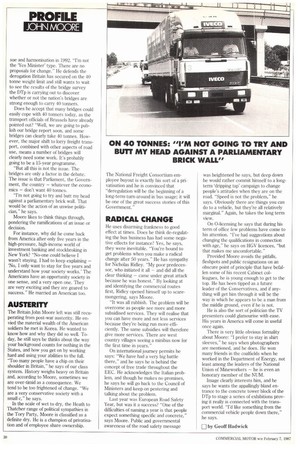ON 40 TONNES: "I'M NOT GOING TO TRY AND BUTT MY HEAD AGAINST A PARLIAMENTARY BRICK WALL"
Page 32

If you've noticed an error in this article please click here to report it so we can fix it.
The National Freight Consortium employee buyout is exactly his sort of a privatisation and he is convinced that "deregulation will be the beginning of a long-term turn-around in bus usage; it will be one of the great success stories of this Government."
RADICAL CHANGE
He uses disarming frankness to good effect at times. Does he think de-regulating the bus business has had some negative effects for instance? Yes, he says, they were inevitable. "You're bound to get problems when you make a radical change after 50 years." He has sympathy for Nicholas Ridley. "My poor predecessor, who initiated it all — and did all the clear thinking — came under great attack because he was honest." By looking at and identifying the commercial routes first, Ridley opened himself up to scaremongering, says Moore.
"It was all rubbish. The problem will be overcome as people see more and more subsidised services. They will realise that you can have more and not less services because they're being run more efficiently. The same subsidies will therefore give more services. There are west country villages seeing a minibus now for the first time in years."
On international journey permits he says: "We have had a very big battle there," and he says he is behind the concept of free trade throughout the EEC. He acknowledges the Italian problem, and though he makes no promises, he says he will go back to the Council of Ministers and keep on pestering and talking about the problem.
Last year was European Road Safety Year, but was it a success? "One of the difficulties of naming a year is that people expect something specific and concrete," says Moore. Public and governmental awareness of the road safety message was heightened he says, but deep down he would rather commit himself to a longterm 'dripping tap' campaign to change people's attitudes when they are on the road. "Speed is not the problem," he says. Obviously there are things you can do to a vehicle, but they're all relatively marginal." Again, he takes the long term view.
On 0-licensing he says that during his term of office few problems have come to his attention. "I've had suggestions about changing the qualifications in connection with age," he says on HGV licences, "but that makes me uncomfortable."
Provided Moore avoids the pitfalls, fleshpots and public resignations on an obscure point of principle that have befallen some of his recent Cabinet colleagues, he is young enough to get to the top. He has been tipped as a future leader of the Conservatives, and if anything will get him through it will be the way in which he appears to be a man from the middle ground, even if he is not.
He is also the sort of politician the TV presenters could glamourise with ease. His years in America will come in useful once again.
There is very little obvious formality about Moore: "I prefer to stay in shirt sleeves," he says when photographers are mentioned, and he does. He won many friends in the coalfields when he worked in the Department of Energy, not least among the leaders of the National Union of Mineworkers — he is even an honorary member of the NUM.
Image clearly interests him, and he says he wants the appallingly bland entrance to the concrete tower block of the DTp to stage a series of exhibitions proving it really is connected with the transport world. "I'd like something from the commercial vehicle people down there," he says.
111 by Geoff Hadwick












































































